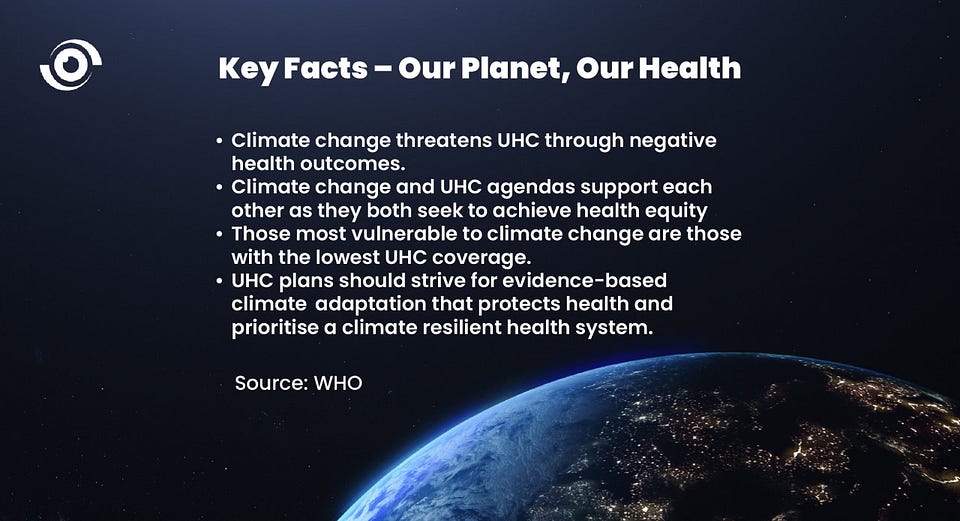By Dara Ajala-Damisa and Vivianne Ihekweazu (Lead Writers)
Today, April 7, is World Health Day, an important day by any standard; one which draws attention to a specific health topic of concern to people all over the world. The theme for World Health Day in 2021 hinged on building a fairer, healthier world through stronger elements of Universal Health Coverage (UHC); the focus in 2022 is on the urgent action that is needed to keep humans and the planet healthy through deliberate climate action. In this article, we demonstrate how interconnected these two themes are and how Nigeria cannot achieve one without the other.
Environmental health is a key component of preventive health and is often overlooked, however it makes up one of the core pillars of UHC and is one of the three components of the One Health approach. A focus on preventive health is also one of the primary recommendations of the recently launched Lancet Nigeria Commission Report that calls for One Nation, One Health.
The phrase, One Nation, One Health, speaks to the imperative correlation between environmental action and Universal Health Coverage. The critical dependence of human health on environmental health means that Nigeria is better positioned to achieve equitable access to quality and affordable healthcare for all Nigerians when health systems align human and environmental health and foster a movement to create societies focused on total well-being.
Why does Nigeria need a UHC champion?
In 2019, Nigeria spent only about 3% of its Gross Domestic Product (GDP) on health, needless to say for a population of over 200 million, this expenditure falls short of what would be adequate for a well-resourced health system. The under investment in healthcare has meant that 70% of healthcare spending by Nigerians is out-of-pocket. If a country’s priorities are reflected in the amount of resources allocated to it, then Nigeria’s current expenditure on health suggests that this sector of the economy is not valued as being a priority. The COVID-19 pandemic and the economic impact that resulted should serve as a wake-up call that “health is wealth”. The health of a population and the strength of a health system contributes significantly to progress in other sectors of the economy. Therefore, multisectoral health-in-all policies to strengthen the health systems is the best bet.

To make progress and improve the nation’s health indices, Nigeria must invest a larger share of its GDP in the health sector and improve governance and allocative efficiency of funds used. Therefore, political commitment is needed to champion the achievement of UHC in Nigeria.
Why should Nigeria’s next UHC champion mainstream environmental health?
Poor investments and policy inaction regarding environmental degradation is having a negative effect on health and contributing to increased poverty, with access to basic water and sanitation impacted. Environmental degradation is also contributing to conflict and instability in the country. This can be seen in areas like the Lake Chad basin which has shrunk by 90%, impacting agricultural output and food security and the nutritional status of the most vulnerable populations.
As extreme weather events become more common, the impact of an already weakened health system will be even more worse felt. Flooding will exacerbate the spread of waterborne disease, overwhelming health systems worsening incidences of diseases like cholera, an epidemic Nigeria is currently battling. While droughts will jeopardise food security for already vulnerable populations. Climate change and the effects of inaction will undermine health gains and achieving UHC will be a tougher goal to achieve if no critical action is taken.

Greater investment in population health — of which environmental health is an important component — will ensure citizens, particularly vulnerable population groups, are more resilient to health risks. The health and socio-economic consequences of climate degradation are felt more acutely among these vulnerable populations, further exacerbating the inequities they already face accessing healthcare and other basic social services.
A UHC champion, while pushing to strengthen the health system should prioritise the implementation of existing policies that are already in place e.g. mandatory state health insurance that will enable access to health care for Nigerians, especially the poor, and mainstreaming policies that address the challenges Nigerians currently face with environmental risks and a deteriorating health-care system.

The most inequitable aspect about climate deterioration is that the most vulnerable population are often more adversely impacted by floods, droughts, land degradation and desertification. These vulnerable groups of people in low-income communities are also the least able to protect themselves and their families against it. These kinds of glaring inequities go against everything the concept of Universal Health Coverage stands for. Thus, making progress towards UHC a must also means taking deliberate steps to close the gaps caused by climate deterioration.
How to mainstream environmental health into Universal Health Coverage
Nigeria’s UHC champion can mainstream environmental health into UHC by working with other critical stakeholders to increase awareness about the impacts of climate change, and ensuring there is greater consideration for a climate transition to a low-carbon economy in Nigeria. Policymakers should strive for evidence-based climate adaptation that protects health and prioritises a climate resilient health system.
In terms of prevention, environmental health should be addressed within the service-oriented nature of UHC. At service-delivery level, human resources for health can be strengthened to deploy counselling and behavioural change models, where environmental health factors such as exposure to contaminated air and water can be prevented. Educating communities on these environmental exposures is paramount to successfully protecting their health status.
The objectives of climate action and UHC are similar: Ensure equity without exception, mitigate health risks, and empower everyone to lead their healthiest lives without suffering financial hardship.
So, we ask, who will be Nigeria’s next UHC champion? Perhaps as Professor Tanimola Akande aptly put it at our 2017 UHC Dialogue, “We do not necessarily need a single #UniversalHealthCoverage champion. We could have multiple local champions advocating for UHC.” As Nigeria hurtles towards an election year, and today as we join all countries across the globe to mark World Health Day, perhaps we can all be UHC champions, advocating for stronger health systems and a healthier planet.


